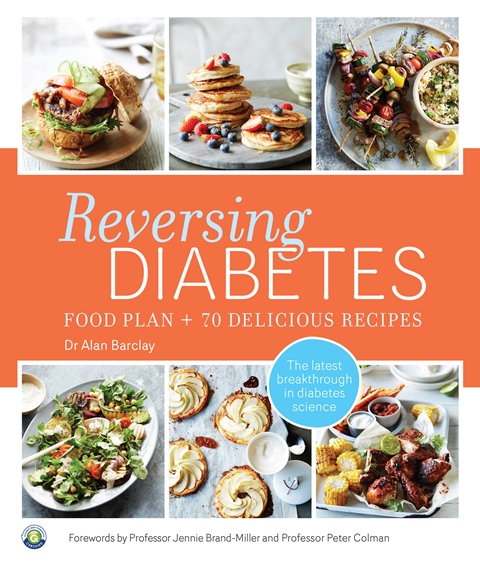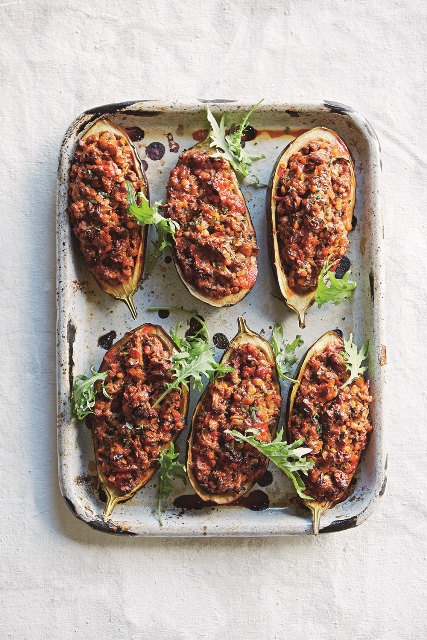Book Review: Reversing Diabetes by Dr Alan Barclay
Written by
on Wednesday, 04 May 2016.
Tagged: book review, diabetes, diabetes friendly, diabetes type 2, nutrition, review, Type 1 diabetes

Type 2 diabetes is everywhere and on the rise. According to Professor Peter Coleman, the Director of Diabetes and Endocrinology at the Royal Melbourne Hospital, in his Foreword to this book, diabetes affects at least 1.1 million Australians. But does eating too much sugar cause it? Should you cut out all carbs to manage it? And is there really such a thing as reversing what is a chronic disease? All these questions and more are answered in Dr Alan Barclay’s new book ‘Reversing Diabetes’.
Not a diet book
‘Reversing Diabetes’ is not a diet book. While it contains an example food plan and plenty of recipes, there is no list of Dos and Don’ts; no foods (or food groups) to be excluded; and no long list of obscure ingredients you need to search for to replace the items currently in your pantry.
 This book is more of a handy resource. Part One (and the first third of the book) takes time to really explain what type 2 diabetes is; the science behind preventing the disease; and busting common myths (FYI the answer is “no”, sugar itself does not cause diabetes and while a lower carb diet may reduce HbA1c levels in the short term, it’s not a long term solution).
This book is more of a handy resource. Part One (and the first third of the book) takes time to really explain what type 2 diabetes is; the science behind preventing the disease; and busting common myths (FYI the answer is “no”, sugar itself does not cause diabetes and while a lower carb diet may reduce HbA1c levels in the short term, it’s not a long term solution).
Dr Barclay explains, in almost textbook-like fashion (albeit with an interesting tone), the major nutrients in foods, their sources and how much of which types we should choose. He cites actual research and evidence-based guidelines without boring the non-scientific reader. Each section is broken into bite-sized chapters.
So how do you reverse diabetes?
This book is only about reversing type 2 diabetes which is associated with lifestyle risk factors as well as genetic and family-related risk factors. Type 1 diabetes is a totally different, autoimmune disease whose cause is unknown and which can be neither prevented nor cured.
While the title of the book is indeed ‘Reversing Diabetes’, Dr Barclay clarifies his claim early on: “While type 2 diabetes cannot be cured as such, it can be put into remission in people who have been newly diagnosed”.
He uses “the word ‘remission’ rather than ‘cure’ because diabetes may return years later, either due to people slowly regaining weight or simply due to advancing age”.
The book advocates a low GI, moderate carbohydrate and moderate protein diet, with a healthy dose of unsaturated fats and dietary fibre. All in all, a balanced diet, one which can also prevent or delay type 2 diabetes, but one which many of us don’t follow.
The practical side...
Dr Barclay doesn’t just tell you to alter your ‘macros’ (nutrients that is), because let’s face it: that means nothing to the individual unless they’re a trained Dietitian. So, the other two thirds of his book is a compendium of “delicious recipes”. And they certainly do look delicious!
 The recipes are divided into the following chapters:
The recipes are divided into the following chapters:
- Snacks
- Soups & light meals
- Meals for two
- Vegetarian dishes
- Main meals
- Easy entertaining
- Sweet treats
Each recipe (think Dukkah-crusted lamb cutlets with jewelled couscous, or zucchini and corn fritters with smoked salmon, and French apple tarts) comes with a full nutrition information panel and tips for storage.
There are a variety of cuisines, gluten-free options and healthy versions of classics like Nachos as well as Lamb vindaloo.
It also includes two, week-long food plans, using many of the recipes listed, as an example of how a healthy day’s eating could look (but not a prescription of how it should).
The author
Dr Alan Barclay is an Accredited Practicing Dietitian with nearly 16 years at Diabetes Australia, a published author of more than 30 peer-reviewed scientific articles and the current Chief Scientific Officer at the Glycemic Index Foundation. He has also worked clinically and in private practice so knows first-hand the real life challenges brought by diabetes. The information in his book is also endorsed by Diabetes Australia and Professor Jennie-Brand Miller who developed the Glycemic Index.
 What I liked
What I liked
- The busting of myths with evidence-based research - not just opinion
- The highlighting of the importance of NOT cutting out foods unnecessarily and considering the social aspects of food, not just the functional
- Some good analogies and comparisons to explain complex terms, for example “insulin resistance is like a jammed door which needs more pressure to open it”
- A comprehensive companion for those recently diagnosed with diabetes or even just those wanting to improve their overall health
- Beautiful recipes that encourage cooking from scratch using wholesome ingredients
The bottom line
A great Australian read, based on evidence and with practical suggestions for eating to put diabetes into remission. I would recommend it to any one with type 2 diabetes, newly diagnosed or otherwise, as a great way to supplement individualised advice from an APD as it sets the facts straight on many widely accepted myths. I may not have diabetes but I still look forward to trying some of the gorgeous-looking recipes, which provide a much more balanced alternative to many other ‘diet’ book offerings.
Thanks to dietitian Megan Cameron-Lee, APD http://thedieteticdegustation.blogspot.com.au for this Book Review
Recipes and Images from Reversing Diabetes by Alan Barclay, (Murdoch Books).
Jemma O'Hanlon
The Good Stuff
The Boring Stuff
© 2025 Foodwatch Australia. All rights reserved
Website by Joomstore eCommerce





